- Home
- Dan Gutman
The Kid Who Became President Page 10
The Kid Who Became President Read online
Page 10
“Wait!” I shouted. “What would you do if you were in my shoes?”
“Use your strength,” Lincoln said. Then he looked down at my fuzzy slippers with a half smile. “And get new shoes.”
With that, Abraham Lincoln faded away.
What did he mean when he said, “Use your strength”? I wondered as I went back to my room. Was he suggesting I use the strength of the United States military against Trujillo? Or was he saying I should use my strength to lead the nation out of this crisis and avoid going to war? Why are ghosts always so ambiguous?
In the hour or two of sleep I got that night, I realized that Lincoln meant something entirely different. When I woke up, I had settled on the strategy I would take with Trujillo.
The crisis had already hit the morning papers by sunrise. TRUJILLO POISED TO INVADE BORAGUAY, screamed a big headline in the Washington Post. MOON WEIGHS OPTIONS.
The four military leaders were waiting for me when I arrived at the Map Room at seven A.M. For all I knew, they had been there all night. Vice President Syers wheeled herself in shortly after me. There was obvious tension in the air.
“Good morning,” I said, snapping off a crisp salute to the generals. “Is there any change in the situation?”
“No, sir,” the secretary of defense reported. “Our satellites show Trujillo’s army is still massing at the border. It’s almost as if he’s waiting to see how we respond, sir.”
“He won’t have to wait much longer,” I informed the group. “I’ve made my decision.”
“To attack?” General Dunn asked hopefully.
“No,” I replied. “I want to meet with Trujillo. Face-to-face. Man-to-man. Alone.”
The generals let out a collective gasp.
“Alone?” Colonel Cooper asked, as if he hadn’t heard me correctly. “Alone,” I repeated. “No generals. No weapons. No nothing.”
“That’s insanity!” the secretary of defense exclaimed.
“This is crazy! He’s just a boy,” scoffed General Dunn, standing up to address the group. “What does he know about handling a military crisis?”
“I know one thing,” I said, raising my voice slightly. “I know that I’m the president. If you can’t deal with that, you can turn in your resignation right now, General Dunn.”
Vice President Syers looked at me approvingly. The general sat back down and kept his mouth shut.
“Sir,” the secretary of defense said, more respectfully. “For you to meet with Trujillo would be very dangerous. He’s a madman.” The other military leaders nodded their heads in agreement.
“But he’s a man,” I replied. “Look, I know it’s dangerous. I considered the options you proposed. We could bomb Cantania. We could blockade them. We could cut off all relations with them. All these options have their problems. I have no guarantee that my idea will work. But we’re going to try it first.”
“I’m not sure your plan is constitutional, sir,” the secretary of defense said.
“Maybe not,” I snapped. “But this is a national emergency. I’m using the executive power that’s granted to the president only in a time of emergency.”
Vice President Syers raised an eyebrow, impressed that I had remembered what she’d told me.
“Send a message to Trujillo that I want to meet with him immediately,” I continued. “If he chooses not to meet with me and advances his troops over the Boraguay border, I want you to bomb Cantania back to the Stone Age.”
“Yes, sir!” the secretary of defense said.
The generals went scurrying off to arrange a meeting with Trujillo. I pushed Vice President Syers’s wheelchair to the elevator. We rode it up to the second floor and she rolled alongside me to the Oval Office.
“If anything happens to me,” I told her solemnly, “I’m sure you’ll make a fine president.”
“You sure you know what you’re doin’, Moon?” Vice President Syers asked.
“No,” I answered honestly. “But remember when you used to babysit for me and I would talk you into letting me stay up past my bedtime?”
“Yeah.”
“And I would talk you into giving me an extra dessert or more video game time?”
“You could just about talk the paint off a wall, Moon,” she chuckled.
“Well, I was always able to get what I wanted by just talking,” I said. “I’m a people person. That’s how I won the election. So I figured I should use my strength and meet with Trujillo one on one.”
“How’d you come up with that crazy idea?” she asked.
“Let’s just say it came to me in the middle of the night,” I replied.
I rolled Vice President Syers back down the hallway and then down the ramp outside the White House. She was unusually quiet, as if she had something to say but wasn’t sure if she wanted to tell me.
“What is it?” I asked.
“I made a big decision last night, too,” she said, embarrassed. “When this whole mess blows over, Chief Usher Honeywell and I are gonna get married. He proposed yesterday.”
I wrapped my arms around Vice President Syers and gave her a big hug.
“So don’t go blowin’ up the world now, y’hear?” she warned, pointing a finger at me. “’Cause that would really louse up my honeymoon.”
Front page of the Washington Post, December 26:
MAN TO … MAN?
MOON TO CONFRONT TRUJILLO
Air Force One is a beautiful plane. It’s a modified 747, blue and white, with the words UNITED STATES OF AMERICA running along each side. The American flag is painted on the tail.
On both sides of the jet’s nose is the presidential seal — an eagle holding arrows in one claw and an olive branch in the other. The arrows represent war and the olive branch represents peace. The eagle is facing the olive branch.
When I said good-bye to my parents at Andrews Air Force Base, I wasn’t sure I would ever see them again. I could return home a hero, or I could return home as the president who started World War III. Or maybe I would return home in a casket. When I hugged my mom, she didn’t want to let go. Neither did I.
Vice President Syers couldn’t come with me on Air Force One. The president and vice president are not allowed to fly in the same plane. Ever. If the plane crashed, the government would be in disarray. As always, I kept the football with me at all times.
Under different circumstances, I could have had a really great time on Air Force One. It’s probably the only plane in the world that has a bed, a lounge, desks, sofas, and two kitchens. As soon as the president takes his seat, the plane starts rolling down the runway. You don’t have to wait a minute. And the food is a lot better than those crummy bags of peanuts they give you on regular planes.
But I couldn’t enjoy any of that. I was thinking about Trujillo. What could I say to him to make him change his mind about invading Boraguay? I didn’t know. I just felt in my bones that if I could sit down with the man and look him in the eye, I could talk him out of doing something crazy.
Trujillo had agreed to meet with me but not in the United States. I told him I wouldn’t meet him in Cantania. I suggested a neutral location — a cruise ship in the Atlantic—and he agreed. We both agreed to arrive with no bodyguards, no advisers, and no weapons.
Air Force One landed at a United States naval base in Brazil. From there, I took a helicopter to the Horizon, a Swedish cruise ship off the coast of Argentina.
I arrived first. The captain of the Horizon greeted me warmly and led me to the room where Trujillo and I would be meeting. He left me alone there.
The room was nearly bare, with just two chairs and a table with a pitcher of water and two glasses on it. There was an intercom that would let us call the captain if we needed anything. I felt around the drapes to make sure there weren’t any hidden listening devices. When I was satisfied, I sat down, put the football on the table, and rehearsed what I was going to say to Trujillo.
He showed up a few minutes later, escorted by the captain. Trujillo
was wearing a military uniform with lots of ribbons and medals dangling off it like Christmas tree ornaments. They didn’t impress me.
“So we meet again, President Moon,” Trujillo said, a cocky tone in his voice. He didn’t stick out his hand, and neither did I.
“Lock the door,” I instructed the captain. “We’re not coming out of this room until we reach an agreement.”
With the room sealed, Trujillo and I stood face-to-face. He was a short man but was still a few inches taller than me.
“It is time to separate the men from the boys, President Moon,” he sneered. “I could just kill you now. Do you realize that?”
“Mr. Trujillo,” I said, “I didn’t come here to separate anything. I came here to bring us together.”
“Bring us together? Ha!” he snorted. “You only came here to protect your precious oil. Without your planes and guns and bombs —”
“Forget about planes and guns and bombs,” I interrupted. “I have a proposal for you. A simple proposal. Either listen to what I have to say, or the United States will take military action against Cantania.”
“What proposal could you possibly have that would interest me?”
“I always thought it was stupid that soldiers have to die in wars when it’s the rulers who have disagreements,” I explained. “Wouldn’t it make more sense if the leaders of the two nations simply fought it out between themselves?”
“Are you suggesting that you and I fight?” Trujillo said with a laugh.
“Yes!” I said. “You and I fight. Right here in this room. If you win, you can go ahead and invade Boraguay. America won’t interfere. And if I win, you pull back your troops and never bother the people of Boraguay again. Either way, no bombs are dropped. No bullets are fired. Nobody has to die.”
“Good,” he said, rolling up his sleeves. “Instead of fighting a war, we will arm wrestle.”
“No,” I said. “You’re obviously much stronger than me. It has to be a fair fight.”
“Guns,” Trujillo suggested.
“No.”
“Swords, then.”
“No.”
“What, then?” he asked.
“Video games,” I replied. “I’m suggesting that instead of a real war, you and I have a virtual war to settle our differences.”
Trujillo looked me over carefully, jamming his hands into his pockets.
“Do you take me for a fool?” he asked. “Video games are a children’s toy. That is no more fair to me than arm wrestling is to you.”
“That’s my offer,” I replied. “Take it or leave it.”
“Why do you get to choose weapons?” he asked.
“Because I’ve got all those planes and guns and bombs,” I replied. “And I’m not afraid to use them.”
Trujillo thought over my proposal for a few seconds.
“I will play a video game against you,” he said, “on one condition — I choose the game.”
“Agreed,” I quickly said. We shook hands for the first time, to seal the deal.
“We will play this game,” he said, as he reached into his pocket and pulled out an Xbox disc. The label read WORLD WAR FOUR.
“What’s that?” I asked.
“A video game,” Trujillo replied. “It belongs to my twelve-year-old son. He plays it so much that I took it away from him this morning.”
“I never heard of that game,” I said. Suddenly, the room was feeling warm and my forehead was sweating. I didn’t even know they had video games in Cantania.
“This game was made by a Cantanian game designer,” Trujillo said with a smile. “A friend of mine. It is not available anywhere else in the world. I think you will enjoy playing it, President Moon.”
“Have you played this game with your son?” I asked.
“For many hours,” he replied. “I have become quite good at it, actually.” I gulped.
Front page of the Washington Post, December 28:
THE WORLD WAITS WHILE
MOON, TRUJILLO MEET SECRETLY
I’m quite good at video games, actually. Once I learn the ins and outs of a game, I can beat just about anybody. Certainly any grown-up. My dad tried to play me a few times, and he was totally pathetic. Trujillo probably wasn’t any better.
But I was rusty. I hadn’t had the chance to play any video games since the election. And if Trujillo had played World War Four with his son and was good at it, he could be tough to beat.
If I lost the game, I knew, my presidency would be a failure. The newspapers would eat me alive. I felt incredible pressure to win.
I also felt like an idiot. Trujillo had tricked me into playing his video game. It was too late to back out. After all, playing a video game had been my idea in the first place.
I pushed a button on the intercom and asked the captain to bring us an Xbox 360 Pro system and a TV set. He sounded surprised by the request but said he would get whatever we needed.
A few minutes later, a guy opened the door and wheeled in a cart with the equipment. As he was setting it up, he stole a few curious glances at Trujillo and me. Then he left and locked the door behind him. Trujillo put his disc in, pushed the POWER button, and WORLD WAR FOUR appeared on the screen.
According to the designer of this game, World War Four will be fought between the two super-powers left after World War Three — the United States and Cantania. North America and South America appear on a split screen, showing the two continents side by side.
“What’s the object of the game?” I asked as I picked up a controller.
“Total nuclear annihilation.”
“You have nukes, too?” I asked.
“But of course,” Trujillo replied with a smile. “It would not be a fair fight if one side had an advantage, would it, President Moon?”
He was looking at me with a grin so big I could see his yellowed teeth. All his life, I guessed, Trujillo had hated and feared the power of the United States. Now his nation was an equal to mine, at least on-screen. He was loving it.
Both nations had an arsenal of a hundred nuclear missiles. Some of them could be dropped from airplanes, others launched from submarines, and some could be fired from the ground. Each player also had a nuclear defense shield — sort of an umbrella you could move around the screen to stop incoming missiles before they hit the ground. The buttons on the controller were used to launch missiles, and the analog stick moved the shield around.
The idea was simple — wipe your opponent’s country off the face of the earth before he does the same to yours. This game would not win any Parents’ Choice Awards for software that is good for kids.
“Shall we begin, President Moon?”
“A warm-up game would be sporting,” I said.
“As you wish,” Trujillo agreed. “That will allow me to destroy America twice.”
Trujillo hit his START button and immediately fired ten nukes from his submarines off the Atlantic and Pacific coasts. Red lines on the screen showed flight paths as the missiles made their way toward American soil. I barely had a chance to blink when Trujillo launched ten more nukes from his bombers streaking across the sky.
Missiles were coming in from all directions. I rushed to defend my biggest cities — New York, Los Angeles, and Chicago — plus Washington, D.C. My shield stopped most of the nukes that were heading for those places, but I couldn’t stop every one. Trujillo started hitting targets in the smaller cities. Ankeny, Iowa, was wiped out in one shot. I lost Hilliard, Ohio; Bibb County, Alabama; and Fayetteville, North Carolina.
When each nuke hit a target, the area for miles around would turn gray, the color of ashes. That meant it was contaminated by nuclear fallout and declared uninhabitable.
“Death to America!” Trujillo yelled when Spring, Texas, was incinerated.
I went to stop the nukes that were heading for the smaller cities, but then Trujillo began aiming for the bigger ones. Quickly, I lost Philadelphia, St. Louis, Houston, San Francisco, and Baltimore. The map of America was turnin
g gray.
“Just like I told you,” Trujillo shouted gleefully, “without a military advantage, my country can crush yours like an insect!”
“It’s not over yet,” I shot back. But in short order I lost Boston and Los Angeles. My situation was hopeless. When Trujillo sneaked a nuke past my shield and wiped out Washington D.C., a huge mushroom cloud rose over America and the whole country turned a sickly gray. GAME OVER, the screen said as the Cantanian national anthem played. THE UNITED STATES HAS BEEN DESTROYED. CANTANIA RULES THE WORLD.
I slammed my fist against the table. I hadn’t had the chance to fire a single missile. “Hahahahahahaha!” Trujillo chortled triumphantly. “Victory is joyous!”
“Hit restart,” I said tersely.
“Why so serious, President Moon?” Trujillo smirked after he had reduced the United States to a pile of rubble. “It’s only a game.”
“Shut up and play,” I said. “This time it counts.”
For all I knew, Trujillo might have had the game programmed so that America would always lose. I wouldn’t put it past him.
But I couldn’t worry about that. Clearly, the strategy I used in the practice game didn’t work. I had to come up with something different, or Trujillo would destroy me just as easily again. And I had to think of a better strategy fast.
It occurred to me that because the United States was so large, it was impossible to defend all of it from incoming missiles. Cantania was a tiny country, about the size of Rhode Island. It was easy for Trujillo to defend his land.
Thinking it over some more, I realized that America’s size also gave me an advantage. I could afford to lose ten, twenty, even thirty large cities and still stay alive. But if I could land just one or two nukes on little Cantania, I might be able to wipe out the whole country.

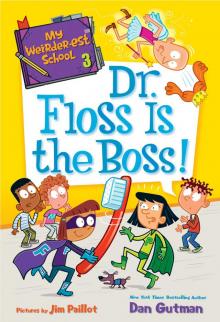 My Weirder-est School #3
My Weirder-est School #3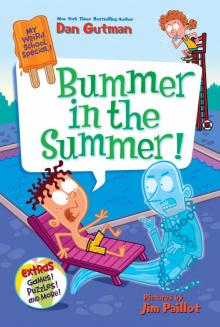 Bummer in the Summer!
Bummer in the Summer!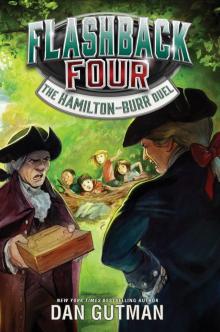 Flashback Four #4
Flashback Four #4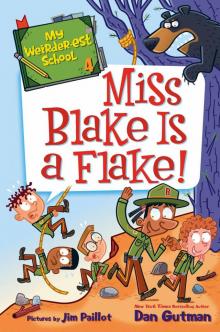 Miss Blake Is a Flake!
Miss Blake Is a Flake!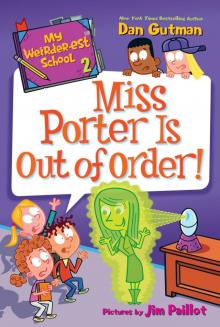 My Weirder-est School #2
My Weirder-est School #2 My Weirder-est School #1
My Weirder-est School #1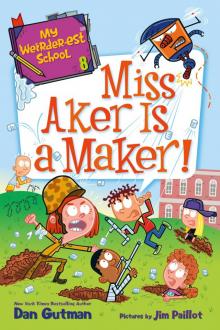 Miss Aker Is a Maker!
Miss Aker Is a Maker!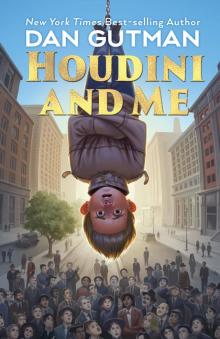 Houdini and Me
Houdini and Me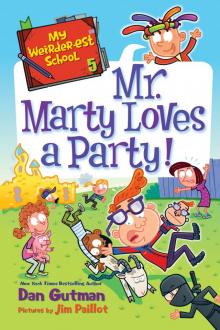 Mr. Marty Loves a Party!
Mr. Marty Loves a Party! Ms. Jo-Jo Is a Yo-Yo!
Ms. Jo-Jo Is a Yo-Yo!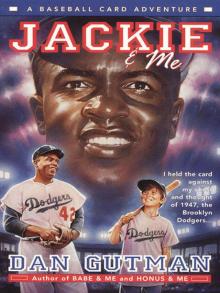 Jackie & Me
Jackie & Me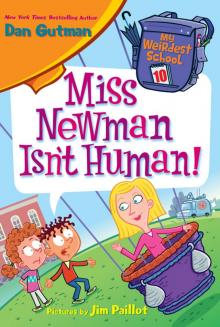 Miss Newman Isn't Human!
Miss Newman Isn't Human!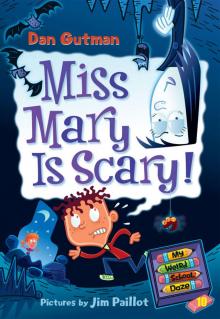 Miss Mary Is Scary!
Miss Mary Is Scary!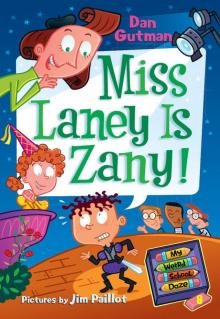 Miss Laney Is Zany!
Miss Laney Is Zany!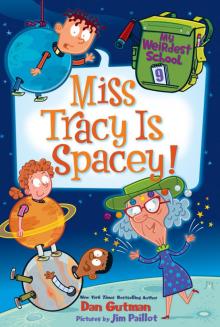 Miss Tracy Is Spacey!
Miss Tracy Is Spacey!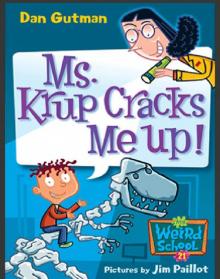 Ms. Krup Cracks Me Up!
Ms. Krup Cracks Me Up!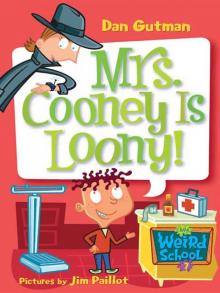 Mrs. Cooney Is Loony!
Mrs. Cooney Is Loony! Dr. Nicholas Is Ridiculous!
Dr. Nicholas Is Ridiculous! My Weird School Special
My Weird School Special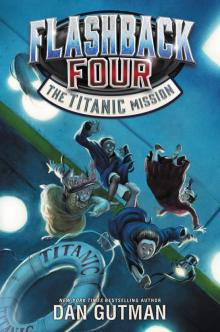 The Titanic Mission
The Titanic Mission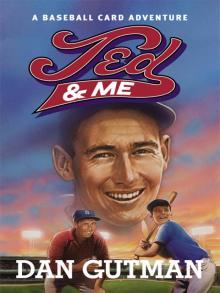 Ted & Me
Ted & Me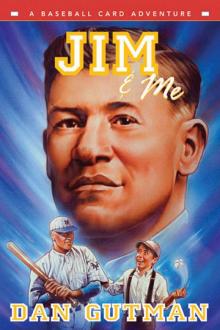 Jim & Me
Jim & Me Miss Child Has Gone Wild!
Miss Child Has Gone Wild! The Talent Show
The Talent Show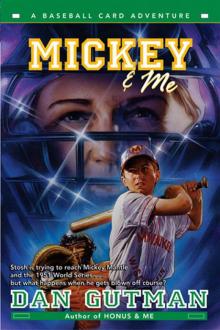 Mickey & Me
Mickey & Me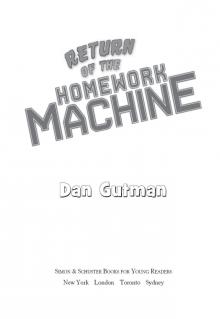 Return of the Homework Machine
Return of the Homework Machine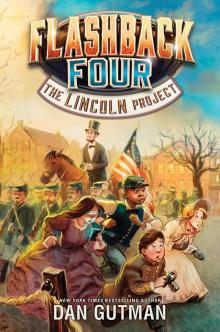 The Lincoln Project
The Lincoln Project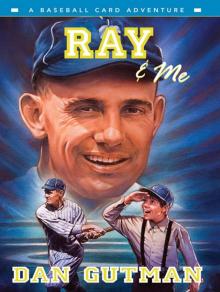 Ray & Me
Ray & Me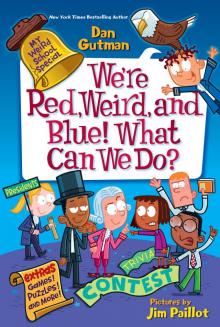 We're Red, Weird, and Blue! What Can We Do?
We're Red, Weird, and Blue! What Can We Do? The Get Rich Quick Club
The Get Rich Quick Club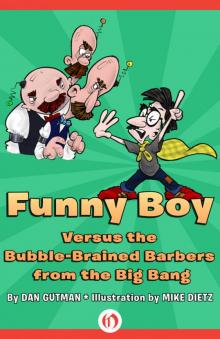 Funny Boy Versus the Bubble-Brained Barbers from the Big Bang
Funny Boy Versus the Bubble-Brained Barbers from the Big Bang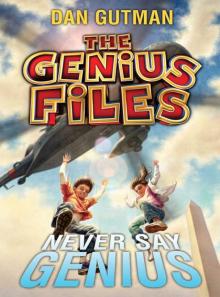 Never Say Genius
Never Say Genius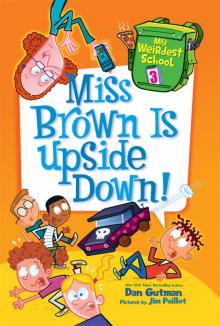 Miss Brown Is Upside Down!
Miss Brown Is Upside Down!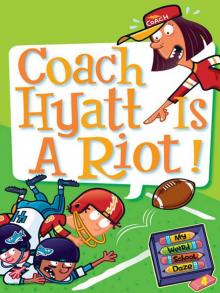 Coach Hyatt Is a Riot!
Coach Hyatt Is a Riot!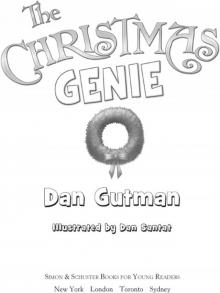 The Christmas Genie
The Christmas Genie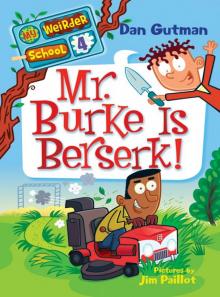 Mr. Burke Is Berserk!
Mr. Burke Is Berserk!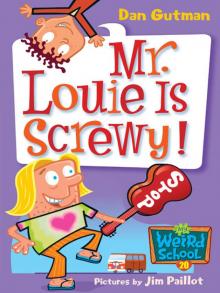 Mr. Louie Is Screwy!
Mr. Louie Is Screwy!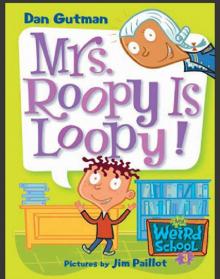 Mrs. Roopy Is Loopy!
Mrs. Roopy Is Loopy!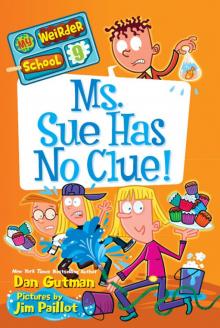 Ms. Sue Has No Clue!
Ms. Sue Has No Clue!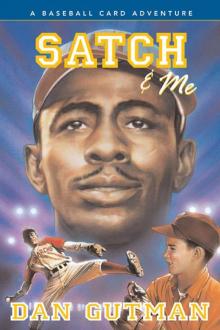 Satch & Me
Satch & Me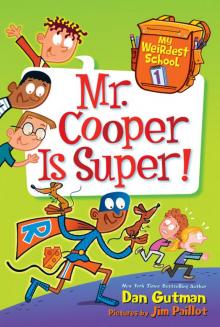 Mr. Cooper Is Super!
Mr. Cooper Is Super!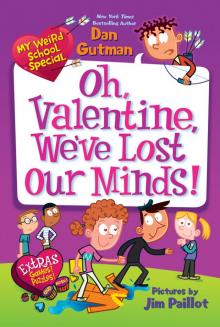 Oh, Valentine, We've Lost Our Minds!
Oh, Valentine, We've Lost Our Minds!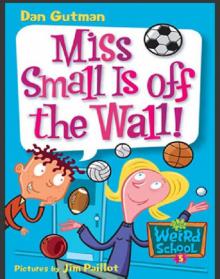 Miss Small Is off the Wall!
Miss Small Is off the Wall!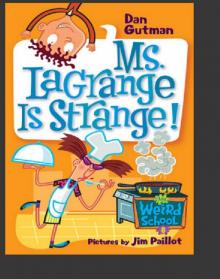 Ms. LaGrange Is Strange!
Ms. LaGrange Is Strange!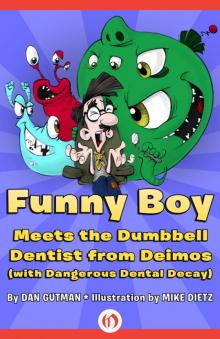 Funny Boy Meets the Dumbbell Dentist from Deimos (with Dangerous Dental Decay)
Funny Boy Meets the Dumbbell Dentist from Deimos (with Dangerous Dental Decay)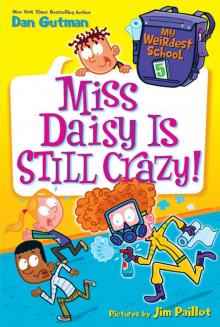 Miss Daisy Is Still Crazy!
Miss Daisy Is Still Crazy!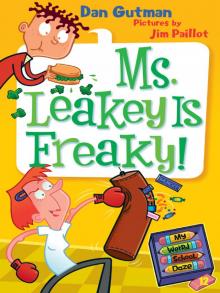 Ms. Leakey Is Freaky!
Ms. Leakey Is Freaky!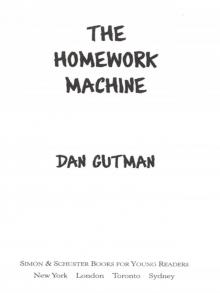 The Homework Machine
The Homework Machine Miss Holly Is Too Jolly!
Miss Holly Is Too Jolly!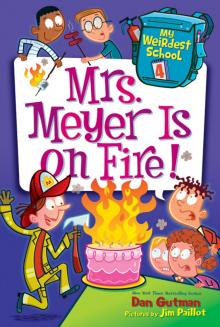 Mrs. Meyer Is on Fire!
Mrs. Meyer Is on Fire!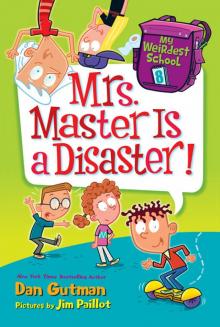 Mrs. Master Is a Disaster!
Mrs. Master Is a Disaster!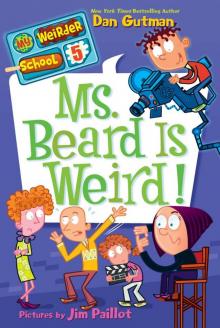 Ms. Beard Is Weird!
Ms. Beard Is Weird!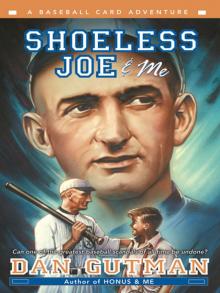 Shoeless Joe & Me
Shoeless Joe & Me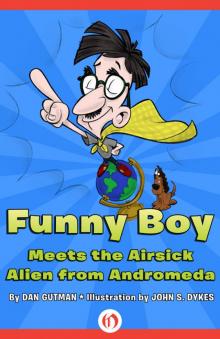 Funny Boy Meets the Airsick Alien from Andromeda
Funny Boy Meets the Airsick Alien from Andromeda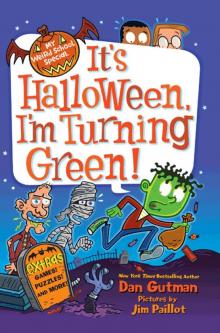 My Weird School Special: It’s Halloween, I’m Turning Green!
My Weird School Special: It’s Halloween, I’m Turning Green!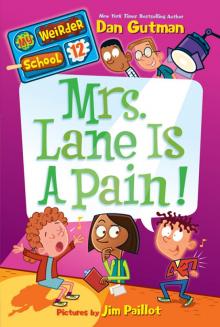 Mrs. Lane Is a Pain!
Mrs. Lane Is a Pain!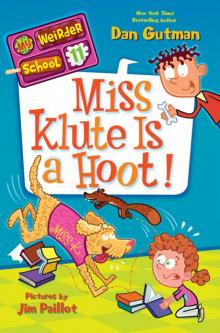 Miss Klute Is a Hoot!
Miss Klute Is a Hoot!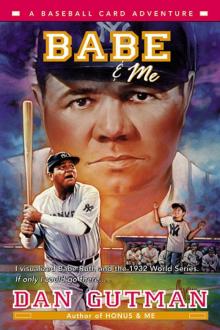 Babe & Me
Babe & Me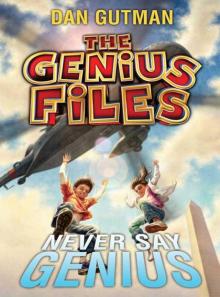 The Genius Files 2 Never Say Genius
The Genius Files 2 Never Say Genius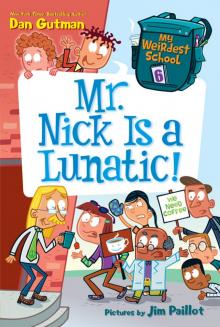 Mr. Nick Is a Lunatic!
Mr. Nick Is a Lunatic!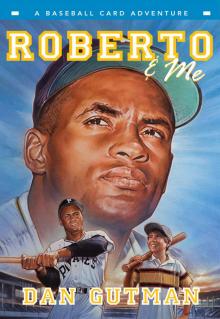 Roberto & Me
Roberto & Me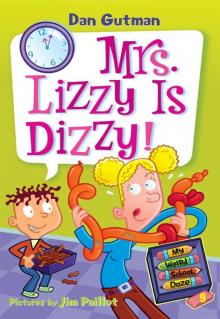 Mrs. Lizzy Is Dizzy!
Mrs. Lizzy Is Dizzy!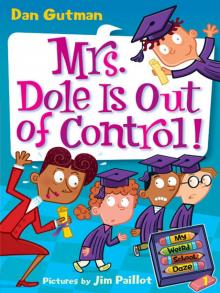 Mrs. Dole Is Out of Control!
Mrs. Dole Is Out of Control!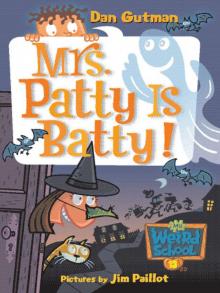 Mrs. Patty Is Batty!
Mrs. Patty Is Batty!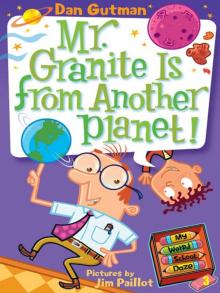 Mr. Granite Is from Another Planet!
Mr. Granite Is from Another Planet!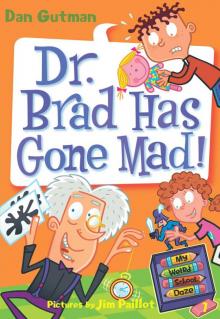 Dr. Brad Has Gone Mad!
Dr. Brad Has Gone Mad!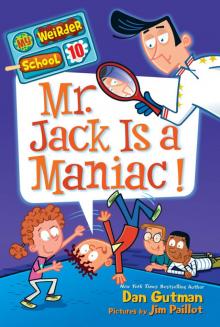 Mr. Jack Is a Maniac!
Mr. Jack Is a Maniac!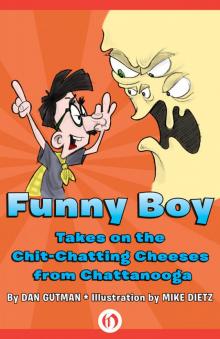 Funny Boy Takes on the Chit-Chatting Cheeses from Chattanooga
Funny Boy Takes on the Chit-Chatting Cheeses from Chattanooga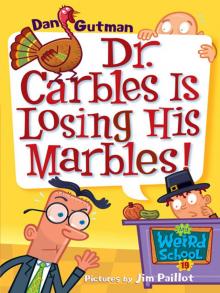 Dr. Carbles Is Losing His Marbles!
Dr. Carbles Is Losing His Marbles!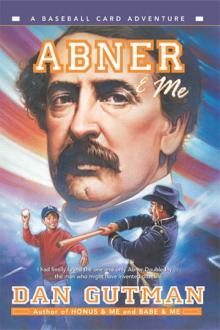 Abner & Me
Abner & Me Ms. Hannah Is Bananas!
Ms. Hannah Is Bananas!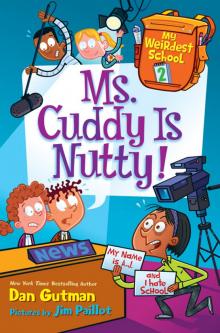 My Weirdest School #2
My Weirdest School #2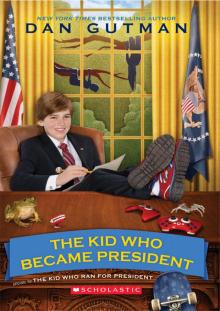 The Kid Who Became President
The Kid Who Became President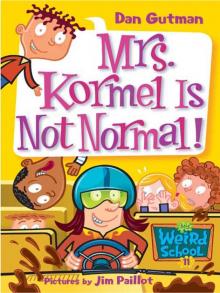 Mrs. Kormel Is Not Normal!
Mrs. Kormel Is Not Normal!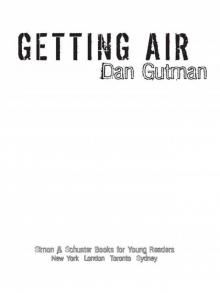 Getting Air
Getting Air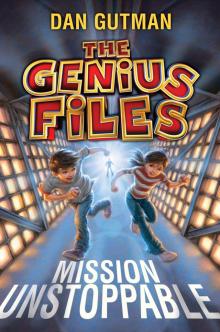 Mission Unstoppable
Mission Unstoppable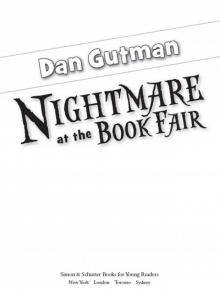 Nightmare at the Book Fair
Nightmare at the Book Fair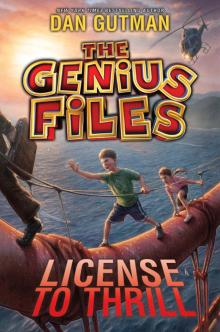 License to Thrill
License to Thrill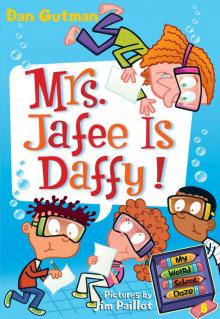 Mrs. Jafee Is Daffy!
Mrs. Jafee Is Daffy!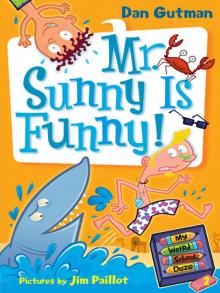 Mr. Sunny Is Funny!
Mr. Sunny Is Funny!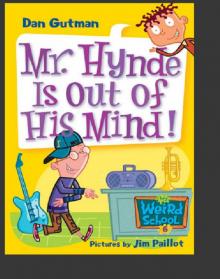 Mr. Hynde Is Out of His Mind!
Mr. Hynde Is Out of His Mind!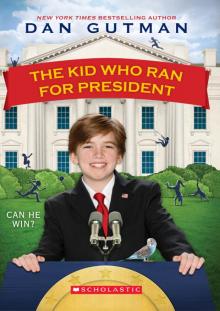 The Kid Who Ran For President
The Kid Who Ran For President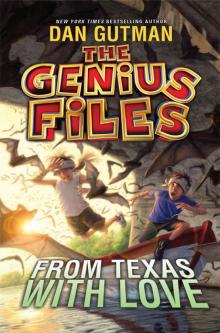 The Genius Files #4
The Genius Files #4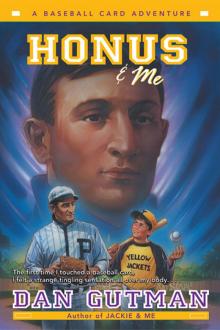 Honus & Me
Honus & Me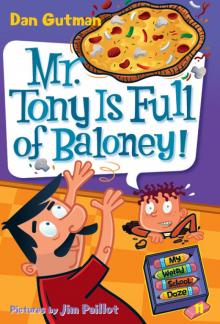 Mr. Tony Is Full of Baloney!
Mr. Tony Is Full of Baloney!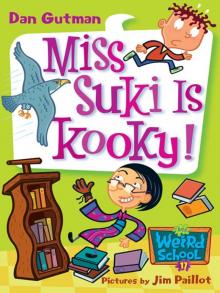 Miss Suki Is Kooky!
Miss Suki Is Kooky!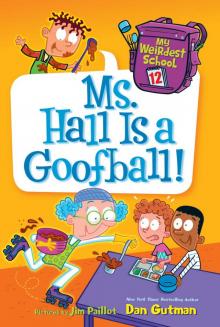 Ms. Hall Is a Goofball!
Ms. Hall Is a Goofball!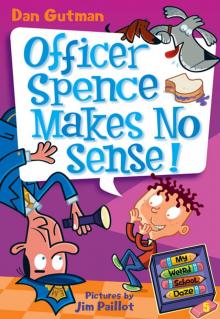 Officer Spence Makes No Sense
Officer Spence Makes No Sense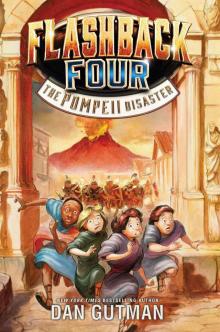 The Pompeii Disaster
The Pompeii Disaster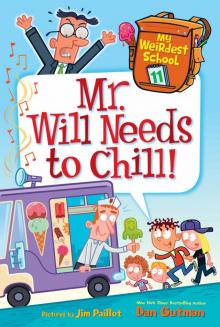 Mr. Will Needs to Chill!
Mr. Will Needs to Chill!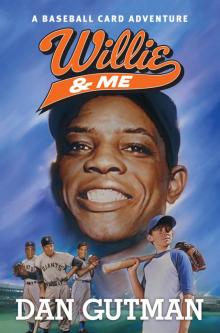 Willie & Me
Willie & Me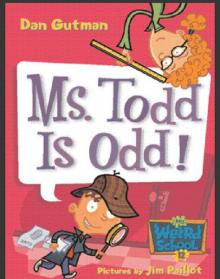 Ms. Todd Is Odd!
Ms. Todd Is Odd!